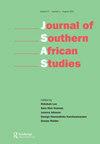他是黑色的;我会在《奇拉帕拉帕:多刺的接近和赞比亚殖民地皮钦语的缓慢消亡》一书中与他交谈
IF 0.9
4区 社会学
Q2 AREA STUDIES
引用次数: 0
摘要
这篇文章考察了奇拉帕拉帕语(Chilapalapa)的历史,这是赞比亚殖民地的一种混杂语。“棘手的接近”被用作一个概念性的工具,用来理解赞比亚许多白人农业社区如何处理令人担忧但又亲密的种族间关系,他们既享有殖民历史的特权,又受到殖民历史的束缚。这篇文章进一步讨论了语言的历史,然后论证了赞比亚白人的语言学习模式,受到经常试图调节情感距离和等级制度的影响,创造了一种情况,在这种情况下,奇拉帕拉帕保留了相当大的地位和权力。这个案例研究证明了语言对正在进行的非殖民化进程的重要性,不仅在更广泛研究的国家层面,而且在人际关系方面。这引发了不平等、归属感和种族问题,这些问题与非洲南部其他国家有关。本文章由计算机程序翻译,如有差异,请以英文原文为准。
‘He’s black; I’ll speak to him in Chilapalapa’: Prickly Proximity and the Slow Death of a Colonial Pidgin in Zambia
This article examines the history of Chilapalapa, a colonial pidgin language, in Zambia. ‘Prickly proximity’ is used as a conceptual tool to understand the ways in which fraught yet intimate interracial relationships are managed by many of the white farming community of Zambia, who are at once privileged by their colonial past and bound by it. The article further discusses the history of the language before arguing that the patterns of linguistic learning among white Zambians, influenced by a frequent attempt to regulate emotional distance and hierarchy, created a situation in which Chilapalapa retained considerable prominence and power. This case study demonstrates the importance of language to ongoing processes of decolonisation, not only at the more widely researched national level, but also at the interpersonal one. This raises questions of inequality, belonging and race which are pertinent for other nations across southern Africa.
求助全文
通过发布文献求助,成功后即可免费获取论文全文。
去求助
来源期刊

Journal of Southern African Studies
AREA STUDIES-
CiteScore
1.40
自引率
0.00%
发文量
73
期刊介绍:
The Journal of Southern African Studies is an international publication for work of high academic quality on issues of interest and concern in the region of Southern Africa. It aims at generating fresh scholarly enquiry and rigorous exposition in the many different disciplines of the social sciences and humanities, and periodically organises and supports conferences to this end, sometimes in the region. It seeks to encourage inter-disciplinary analysis, strong comparative perspectives and research that reflects new theoretical or methodological approaches. An active advisory board and an editor based in the region demonstrate our close ties with scholars there and our commitment to promoting research in the region.
 求助内容:
求助内容: 应助结果提醒方式:
应助结果提醒方式:


